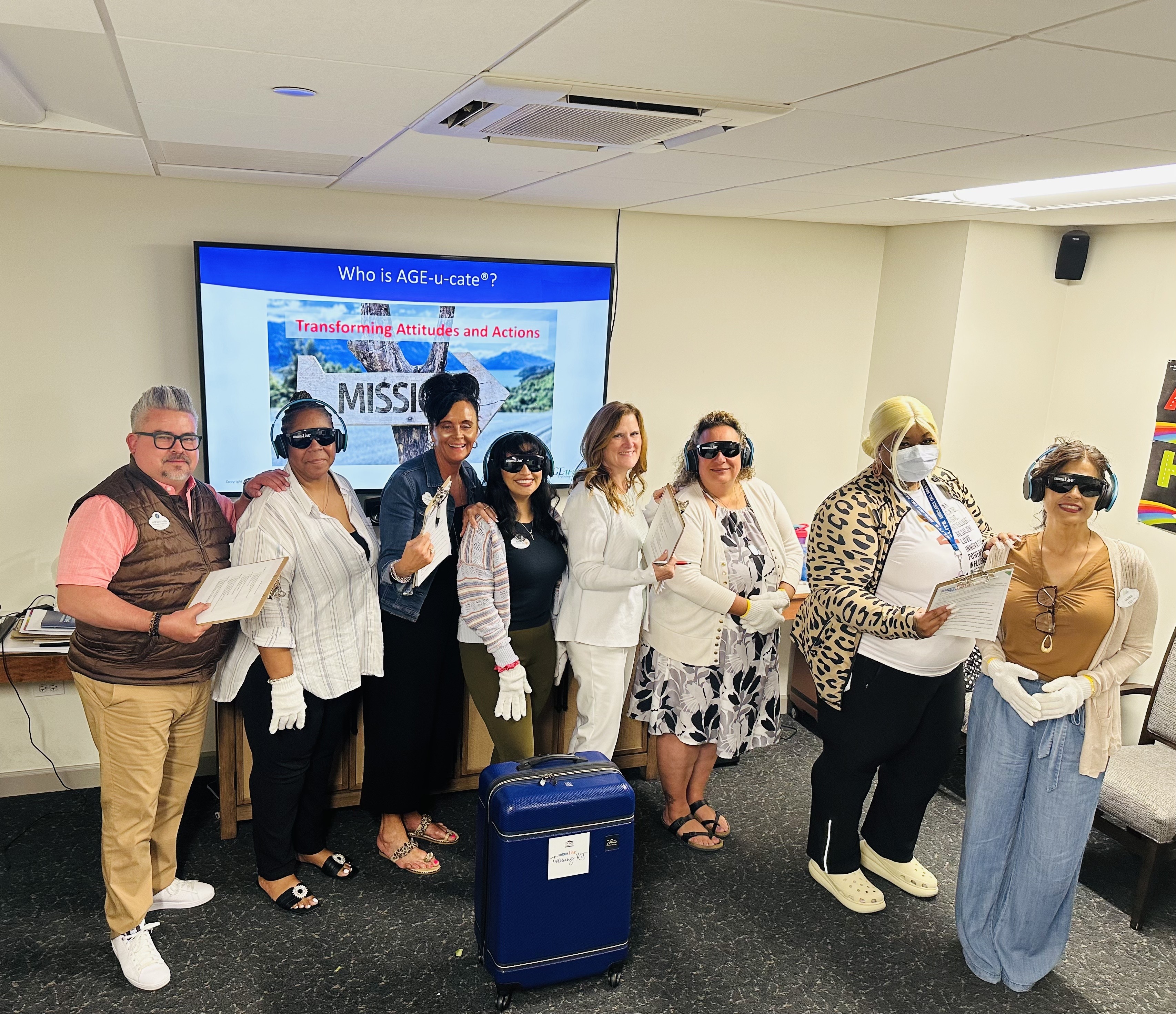The Second Pillar for Aging Services Workforce Retention: Non-Traditional Pathways for Growth and Advancement
This is the second installment in a three-part series addressing retention strategies for aging services providers.

This is the second installment in a three-part series addressing retention strategies for aging services providers.

This is the first of three articles about Workforce Development in Aging Services. The focus of the articles will encompass three pillars:
1. Adopting Best Practices to Retain the Current Workforce
2. Creating Non-Traditional Growth and Advancement Pathways
3. Cultivating the Next Generation Aging Services Workforce
This topic is of great importance due to the national and global caregiving crisis for both paid and unpaid caregivers. This series will focus only on paid caregivers, with an acknowledgement that the unpaid caregiver crisis impacts the need and demand for more paid caregivers.
Let's begin the discussion about the Aging Services Workforce by acknowledging that there are many wonderful and committed people caring for elders throughout the continuum of care- 3.7 million according to this LeadingAge Vision White Paper.
Sadly, the massive turnover experienced in this industry will keep the rotating door busy, without even considering the increasing demand due to the aging population.
So, before addressing the need for new entrants, we should begin with discussing strategies to retain our current employees. The LeadingAge Vision White Paper above provides an excellent roadmap of six strategies to build workforce and my intent with this series is to enhance the conversation by approaching the issue of retention from other angles.

In a concerted effort to advance approaches for dementia care, AGE-u-cate™ Training Institute and The Arbor Company are introducing significant refresh initiatives. AGE-u-cate has updated its Dementia Live® white paper to incorporate the latest research and best practices, providing a comprehensive resource for caregivers and healthcare professionals. Simultaneously, The Arbor Company is enhancing Dementia Live within their senior living community landscape by hosting in-person coach training sessions through regional events, ensuring that program coaches are equipped with cutting-edge techniques and insights to foster deeper understanding and empathy for those living with dementia.

Family caregivers of individuals with dementia face unique challenges, often experiencing higher levels of stress compared to caregivers of those with other chronic conditions. According to the Alzheimer’s Association, more than 11 million Americans provide unpaid care for people with Alzheimer’s or other dementias, collectively contributing over 15 billion hours of care annually.

In today's fast-paced healthcare environment, the human touch can sometimes be overlooked. However, research consistently shows that compassionate communication is crucial for patient outcomes, healthcare provider well-being, and overall organizational effectiveness. Let's look at the importance of compassionate communication in healthcare, drawing on key research findings to highlight its benefits and impact.

Dementia, a debilitating condition characterized by a decline in memory, language, problem-solving, and other cognitive skills, poses significant challenges not only to patients and their families but also to health care systems globally. As the population ages, the prevalence of dementia is increasing, leading to escalating health care costs that burden both individuals and health care plans. Despite ongoing efforts, health care plans continue to struggle in effectively reducing the high costs associated with dementia care.
Dementia affects millions of people worldwide, with Alzheimer's disease being the most common form. The World Health Organization (WHO) estimates that around 55 million people are living with dementia, and this number is projected to reach 78 million by 2030 and 139 million by 2050. In the United States alone, the Alzheimer's Association reported that dementia-related costs reached $355 billion in 2021, a figure expected to soar to over $1 trillion by 2050 without significant interventions. According to the Centers for Disease Control and Prevention (CDC), about 5.8 million Americans were living with Alzheimer's disease in 2020, and this number is expected to nearly triple by 2060.
Dementia care is inherently complex and multifaceted. It encompasses medical treatment, long-term care, and supportive services. Patients often require round-the-clock supervision, assistance with daily activities, and specialized care that addresses their unique needs. This complexity drives up costs, making it challenging for health care plans to manage expenses effectively. A study published in the Journal of the American Geriatrics Society found that the average total cost of care for a person with dementia is approximately $287,000 over a five-year period, with long-term care being the most significant expense.
Several factors contribute to the difficulty health care plans face in reducing dementia care costs:
Early Diagnosis and Intervention: Early diagnosis of dementia is crucial for effective management, yet it remains a significant challenge. The Alzheimer's Association estimates that only about 50% of people with dementia are diagnosed at an early stage. Health care plans struggle to implement widespread screening and early intervention programs due to limited resources and varying access to diagnostic tools.
Lack of Standardized Care: There is no one-size-fits-all approach to dementia care. Each patient's progression and needs are unique, requiring personalized care plans. This lack of standardization makes it difficult for health care plans to implement cost-effective, uniform strategies. Research from the RAND Corporation indicates that standardizing care protocols could potentially save billions in health care costs annually.
Caregiver Support: Informal caregivers, often family members, provide the majority of dementia care. However, they receive little support and training, leading to burnout and increased health care utilization. A study in Health Affairs highlighted that caregiver burnout can increase health care costs by 23% due to higher use of emergency services and hospitalizations. Health care plans are challenged to provide adequate resources and respite care for these caregivers to prevent further costs.
Pharmaceutical Limitations: While there are medications available to manage dementia symptoms, they are not curative. The development of disease-modifying therapies has been slow and expensive. Health care plans face the challenge of balancing the cost of these medications with their limited efficacy. According to a report by the Pharmaceutical Research and Manufacturers of America (PhRMA), the failure rate for Alzheimer's drugs in clinical trials is 99.6%, reflecting the high costs and challenges in developing effective treatments.
Long-Term Care Costs: Long-term care facilities and home-based care options are expensive. As dementia progresses, the need for these services increases, placing a significant financial burden on health care plans. Additionally, the quality and availability of long-term care vary widely, complicating efforts to standardize costs. The Genworth Cost of Care Survey found that the median annual cost of a private room in a nursing home was $105,850 in 2021.
Despite these challenges, there are strategies that health care plans can adopt to mitigate the high costs of dementia care:
Promoting Preventive Measures: Investing in public health campaigns that promote brain health and preventive measures, such as cardiovascular health and cognitive training, can help reduce the incidence of dementia. Research from The Lancet Commission on Dementia Prevention, Intervention, and Care suggests that addressing modifiable risk factors could prevent or delay up to 40% of dementia cases.
Enhancing Early Detection: Implementing widespread screening programs and training primary care providers to recognize early signs of dementia can facilitate earlier diagnosis and intervention, potentially slowing disease progression. The CDC's Healthy Brain Initiative emphasizes the importance of early detection in improving outcomes and reducing costs.
Supporting Caregivers: Providing resources, education, and respite care for informal caregivers can reduce their burden and prevent burnout, ultimately lowering health care utilization. The Family Caregiver Alliance reports that supporting caregivers with training and respite care can significantly reduce health care costs and improve patient outcomes.
Expanding Community-Based Services: Developing and funding community-based services, such as adult day care programs and in-home support, can offer more affordable alternatives to long-term care facilities. The AARP Public Policy Institute found that expanding home and community-based services could save Medicaid an estimated $9 billion annually.
Investing in Research: Continued investment in research for disease-modifying therapies and better understanding of dementia can lead to more effective treatments and potentially curative solutions, ultimately reducing long-term costs. According to the National Institutes of Health (NIH), increasing funding for Alzheimer's and dementia research has led to significant advances, but sustained investment is crucial for future breakthroughs.
The challenges in decreasing the high costs of dementia care are multifaceted and complex. Health care plans face significant obstacles, from early diagnosis to long-term care. However, through preventive measures, early detection, caregiver support, community-based services, and investment in research, there is hope for more effective cost management and improved care for dementia patients. Addressing these challenges requires a collaborative effort from health care providers, policymakers, researchers, and communities to ensure a sustainable and compassionate approach to dementia care.
To learn more about how AGE-u-cate Training Institute is collaborating with health care plans, payors and health systems to address community-wide dementia awareness, education, and training, contact us today.
